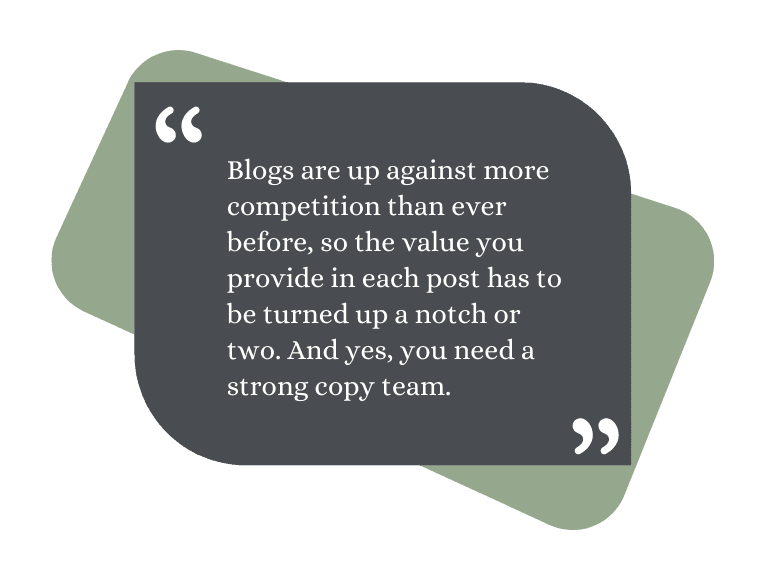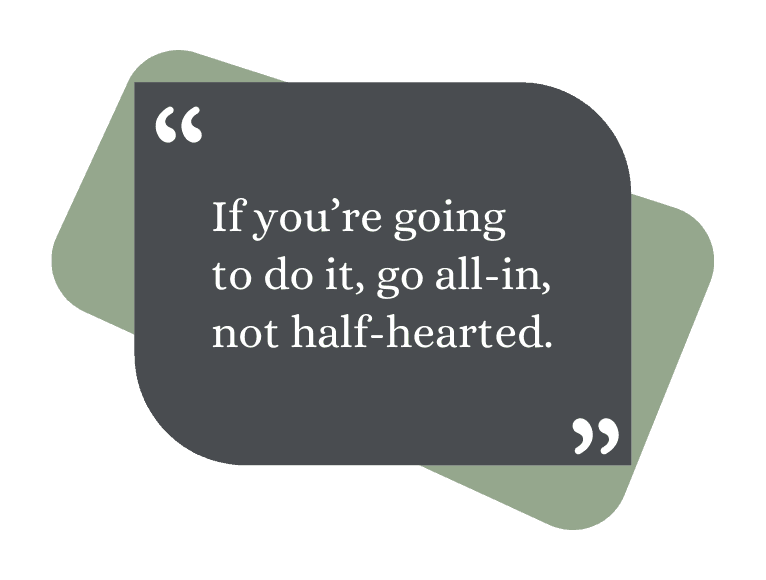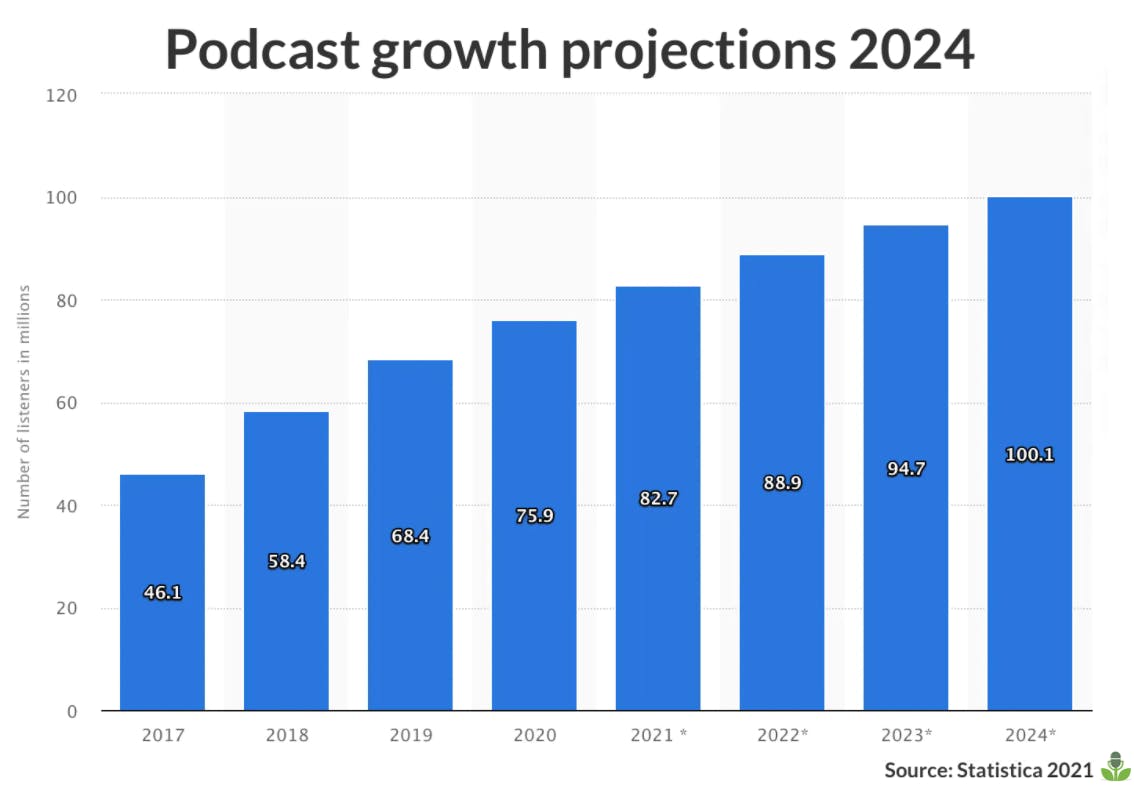Why businesses don’t bother with podcasts (and why they should)
Podcasting

Podcasts are trendy. By trendy, I mean they’re in fashion; they’re going through their phase.
I’ve heard some people say they’ll be here today and gone tomorrow. I prefer to think of podcasts as merely a format, or content delivery mechanism. It sounds cold, but a podcast isn’t a puppy you buy during lockdown.
My business is podcasting and copywriting. I see both as formats: one is audio, the other is the written word. As with most things, it’s more complicated than that, but at their simplest, they both produce content. It’s how they are delivered that makes them different.
Is writing a fad, soon to disappear once the next fashion comes along? No, it isn’t. In fact, I’ve read that advances in machine learning that generate articles will become commonplace. Writing is here to stay, so long as people want to read. Audio, whether the naysayer likes it or not, is also here to stay. Podcasts have been around for years, and new research says they are increasing in popularity. Hardly a fad.
HubSpot recently said: “Like video before it, voice content is fast shifting from nice-to-have to must-have.” So, why do so many businesses eager to be seen and heard not grasp the potential for podcasts to do the content legwork?
The reasons businesses are intimidated by podcasts
This will be a short section. Businesses are intimidated by podcasts because they don’t listen to them. I have first-hand experience of talking to podcast naysayers who, when asked what podcasts they listen to to have arrived at this conclusion, respond: “I don’t listen to them.”
Another reason is that the idea of starting a podcast series is hard work, technically difficult, and labour-intensive. I sympathise with these points of view. A podcast can be hard work, it can be challenging to get to grips with the tech side of things, and yes, it takes commitment and people power to achieve it. But these obstacles can all be overcome (and it’s what I do for a living).
If you look at blogging, one of the reasons blogs fail is that they’re not published regularly enough because there’s no one in your organisation willing to step up and write them, nor are there enough skilled writers. Yet, blogging is so important! Podcasts are the same. If there isn’t enough skill in your organisation to take on a podcast series, why not farm it out? It would be less expensive to do so, and you can generate regular, relevant content for your audience. Let’s go into this a little more …
What’s the benefit of content?
You have to ask this question before you embark on a marketing push because you have to believe in what you’re doing. Without belief, your heart won’t be in it. You have to be able to empathise with the needs and wants of your audience so that you’re better able to answer questions and deliver solutions. To fulfil these needs and wants, you have to prove to your audience that you have the credentials to satisfy them, and the content to validate your expertise.
This is where canny companies begin their journey into a world of content calendars and blog writing. Blogging is still a fantastic way to increase brand visibility. Yet, as with any form of content creation, you need the right people and the right mindset in place.

Audio is a more formidable format for engaging people (in my opinion, though statistics are showing this too). While many businesses commit resources into blogging, “37 seconds is the average time a reader spends reading a blog post”. Compare this to the average podcast listener, 80% of whom listen to all or most of every episode they start. This is great engagement, and is definitely what you want to hear if your business strategy for the next couple of years is to nurture customer relationships and deepen brand loyalty.
Another benefit to audio is that you’re providing a human voice to your content endeavours, which is great for your brand, as well as helpful for engagement opportunities. Imagine, for instance, that you write at the end of a blog post: “Write in and let’s explore this topic more.” In my experience, hardly anyone writes in, and the comments section can be a minefield of negativity. If you say the same thing on your podcast, then read out the best questions in your next episode, you’re creating solid gold audience interaction. The listener feels connected to your show, and ultimately to your brand. From this, you create leads.
So, do I create a blog or a podcast?
Do both if you can. If you have the time, willing and expertise, commit to a confident content strategy for the next year and see how it goes. Monitor how your bottom line looks, or sales calls, or marketing statistics. Monitor brand visibility with all the fancy tools you can muster.

A blog creates a podcast creates a blog. It’s simple. One helps the other. Before you know it, one clever software engineer’s idea to write a short post about Ruby on Rails becomes two blogs, then three, and a podcast series that reflects your organisation’s competence as a software technology expert. You may not always have a perfect call to action, or a measurable return on investment, but rest assured that with enough content produced with enough regularity, you will see a change.
The statistics bear this out. Let’s take a simple podcast interview with an industry expert. You invited them on to talk about something related to your business proposition, such as food ingredients. It’s a fantastic chat that lasts about 20 to 40 minutes. People tuning in on their mobile phones, or in their cars, lap it up in super-fast time. They get bags of information from the episode and go away thinking more about you, your guest, your brand, the topic, and the podcast itself. And because 94% of podcast listeners are incredibly active on every social media platform (which is 13% more than the entire US population), they share what they heard with their followers. This is priceless.
The next step is to create a blog from that podcast episode. The blog will be longer than usual because it will comprise a transcript of the interview. A 20-to-40-minute show could translate to more than 3,000 words, and will be keyword-rich without you even thinking about it. And according to HubSpot, “articles with a word count over 2,500 earn the most links”. In other words, more sharing opportunities and more brand visibility.
Then you share the blog and the episode with social media campaigns for each of your channels, increasing visibility even more. This all came from one chat.
I’m convinced. How do I get started with my content strategy?
That’s a tough one to answer because there are a few different starting places. HR experts may tell you to start with hiring the right people, or outsourcing the job to a professional (like me). Others will say it’s about understanding who your audience is, so you don’t waste time travelling down blind alleys. Another approach is to spend big on a bunch of software tools that look mightily convincing, but only measure stuff instead of creating it. (And you can’t measure what you haven’t created.)
Wherever you start, don’t forget to believe in it first. Podcasts, as with blogs, are no passing fad. They will stick around because they’re easier to produce than video, less expensive, and just as incredibly engaging. Statistica has produced these growth projections for podcasts up to 2024:

Podcasts are already really popular in the US and UK, and are growing fast in South America and China. People want to consume what you have to share. If it’s value derived from your expertise in a specific field, why wouldn’t you want to share it with a content medium famed for its high rate of audience engagement?
It’s true that listeners may not immediately find your brand via your website. A great many podcast listeners find new shows by searching Apple Podcasts or Spotify, or with a browser search, or by following you or your guest on social media. It may not be the measurable traction you’re looking for to vindicate its existence against your ROI, but it’s evidence that word of mouth and SEO are as important as ever to the success of a business. And every successful business has a multi-faceted approach to finding new leads.
Most organisations achieve success (whatever that looks like for them) by having many tentacles. They have solid leadership, a clear sales pipeline, talented producers or creators, great communication channels through every department, from HR to finance and beyond, and a fantastic marketing team. The key to a winning content strategy is for your marketing team to know how to knit the fragments of knowledge and expertise together. Whether it’s a blog, a video, a podcast, or a TikTok dance by your CEO, they should know what ticks boxes for your audience.
Trust them with the budget to do their thing, make sure they have a clear content plan, and let them fly.



